Weekly Workshop: Ukraine, Icahn, Warren and Charlie, Caesar’s Palace, Lion Tracker, Twitter Snacks
"In a society where the individual self is disconnected from the greater interconnectivity of life, the search for meaning is reduced to a constant state of comparison." Boyd Varty
Hello everyone.
What an awful and disheartening week. I’ll be the first to admit that I was taken by surprise by Putin’s large scale invasion of Ukraine. I was born a few years before the Berlin Wall came down and grew up in Germany, far removed from any threat of war. One could call it a safe and sheltered world that fostered complacency.
It has been infuriating to watch my home country’s timid response and its longtime naiveté with regards to Putin. Shutting down its nuclear power plants made it highly dependent on Russian energy imports. And German defense spending has been far below the NATO target for years. Doomberg has written extensively about the troubles of energy policy and commented on this point as well:
“We aren’t sanctioning Putin directly, and we aren’t sanctioning their energy sector. How could we? The entire German economy is dependent on the whims of Putin, and by extension so too is the economy of broader Europe.” It's Time to Get Serious About Energy
This kneecapping of the country’s capabilities came on top of a natural interest in maintaining good relations for the benefit of its industrial exports. Perhaps unsurprisingly, Germany seems to have been the last hold-out on the SWIFT cutoff and just now agreed to supply lethal aid. I felt ashamed of this milquetoast response, especially in light of the country’s history.
My friend Tom Morgan shared a fitting quote: “As George Orwell wrote, ‘sooner or later a false belief bumps up against solid reality, usually on a battlefield.’” Sadly, it seems we’ve finally reached that point and my thoughts are with the brave Ukrainians who have to face overwhelming aggression. Thankfully, at least their leaders seem to be rising to the occasion.
I get a lot of my information through Twitter and it’s been interesting to consider whether its useful to follow events in real-time (through curated lists of accounts sharing open source intel such as Open Source Intel, “war”, Ukraine-Russia). One can be a step ahead of mainstream media. But it is inefficient, noisy, and ripe with misinformation and propaganda.
As I wrote in endgames, trying to accurately predict how complex adaptive systems unfold is futile and provides a false sense of certainty that only feels comforting. And yet, we have to consider the new currents of reality and adapt. As Druckenmiller pointed out:
“If there's one thing I've learned, currencies probably being the most obvious, every 15 or 20 years, there is regime change. So, currency is traded on current account until Reagan came in and then they traded on interest differentials. And about five years, 10 years ago, they started trading on risk-on, risk-off.”
I hope that Putin is overplaying his hand and that this war will ultimately prove to be the seed of his undoing. I’m not sure what odds to assign to that. But it’s my hope. Either way, I have been forced to update my priors.
This week:
Icahn documentary
Warren and Charlie
Book: Caesar’s Palace Coup
Pod: Boyd Varty, lion tracker
Twitter snacks
Next week we’ll look at recent quarterly letters and write-ups.
Disclaimer: I write for entertainment purposes only. This is not investment advice. Seek your own financial, tax, and legal advice before making any investment decisions. Do your own work! I am are not your fiduciary or advisor.
💡You could be sponsoring posts like this one if you’re looking to reach 8,000+ thoughtful subscribers and many more readers on Twitter.😏
Icahn Documentary
I recently watched the Carl Icahn documentary on HBO (see my highlights). Despite the extensive use of CNBC anchors and footage I enjoyed it and found a handful of valuable lessons. Much of the film acts as a platform for Icahn to talk about his legacy as a change agent in a calcified corporate America. It’s balanced out somewhat by showcasing one notable failure, TWA (which is also the turning point after which “Icahn the raider” became “Icahn the activist).
Icahn lost his capital early on speculating on leverage. He subsequently “went to work” and developed a new strategy and eventually found his “no-brainers” - deep value situations where he could act as the catalyst by bulldozing management and catalyzing takeovers. He created a lot of shareholder wealth as a byproduct of his unrelenting quest for riches. It’s interesting to see that he compared himself to both artists and conquerors.
“Part of my values is to make money and I can't change my values. A great painters love to paint. What do you to, criticize him because he likes to paint?”
“It's like Alexander the Great, right? He's 31 years old and he won Persia. He cried because he didn't think there was any place else to go to do a battle. He just kept going and going until they killed him. And I think about that. I’m a little bit like that. Just keep going at it.”
Watch for what, or rather who, you don’t see. Icahn’s longtime analyst and right-hand man Al Kingsley appears only once for a few seconds. I wrote about him before. While Icahn became a billionaire, he didn’t foster an ecosystem of wealthy and successful partners surrounding himself. “You learn in this business: It you want a friend, get a dog,” he once said. Consider this carefully when you choose bosses or partners.
The film also highlights how Icahn is passing on the baton to his son Brett. It illustrates how much more fun it is to make billions once you have them. Carl Icahn had to battle in the trenches for decades. His son could make bets on quality companies like Apple and Netflix and invite CEOs like Tim Cook for discussions over dinner. Granted, it still takes skill and conviction to execute. But it’s a very different skillset (and stress level) from Carl’s combative style. Also note that Icahn could have earned multiples if he had held on to both companies. I’m not criticizing him - it makes perfect sense that he sold given his investment philosophy. And you can’t expect this tiger to change his stripes in his 80s.
If you’re looking for more old school footage of Carl, check out this interview from 1985.
Warren and Charlie
Speaking of aging predators, Berkshire published its 2021 letter (for detailed notes: @MBI highlights, @BRK_Student on the annual report):
“Charlie and I are not stock-pickers; we are business-pickers.”
“I taught my first investing class 70 years ago my toughest audience was my grandson’s fifth-grade class. … Teaching, like writing, has helped me develop and clarify my own thoughts.”
“There is nothing more rewarding to Charlie and me than enjoying the trust of individual long-term shareholders who, for many decades, have joined us with the expectation that we would be a reliable custodian of their funds.”
“Long-term individual owners are both the “partners” Charlie and I have always sought and the ones we constantly have in mind as we make decisions at Berkshire. To them we say, “It feels good to ‘work’ for you, and you have our thanks for your trust.”
Charlie on inflation:
“Inflation is a very serious subject. ... You could argue that it's the way democracies die. ... So it's a huge danger once you've got a populace that learns it can vote itself money. If you look at the Roman Republic, they inflated their currency steadily for hundreds of years, and eventually, the whole damn Roman Empire collapsed. So it's the biggest long-run danger we have probably, apart from nuclear war.”
Daily Journal annual meeting (transcript, video):
“I think the investment world is plenty hard. In my lifetime, 98 years, it was the ideal time to own a diversified portfolio of common stocks that updated a little by adding the new ones that came in like the Apples and the Alphabets and so forth. I’d say people got maybe 10 or 11% if you did that very intelligently before inflation and maybe 8 or 9% after inflation. That was a marvelous return. No other generation in the history of the world ever got returns like that. And I don’t think the future is gonna give the guy graduating from college this year nearly that easy an investment opportunity. I think it’s gonna be way harder.”
After these sobering words keep in mind that we must balance the wisdom of our elders with the optimism and drive of the new generation:

Caesar’s Palace
Long-time readers may remember the Caesar’s Palace casino from my piece on Kirk Kerkorian. I recently finished The Caesar’s Palace Coup, a book about the knife fight over Caesar’s Entertainment between buyout firms Apollo and TPG and a rotating cast of credit funds including Oaktree, Elliott, Appaloosa, and GSO (now part of Blackstone). It’s a crash course in distressed investing and you should be prepared for a lot of yelling and expensive lawyers debating the minutiae of indentures. If you’re interested, there’s a free case study with detailed financials.
The book also gives a glimpse at Apollo’s culture in which “lively debate” (aka screaming) and internal competitiveness are encouraged foster “clever deal making” and let the best ideas win. Apollo’s CEO Marc Rowan saw their abrasive lead dealmaker on Caesar’s as “flawed” but an embodiment of Apollo’s values: “brilliant, unrelenting, and fearless.” There is a trade-off, of course: “Apollo’s a place where you go to the office, do your work and go home. You don’t really socialize with your colleagues.”
Funny enough, both Tepper and Icahn make brief appearances in the book and earned billions from distressed casinos with Icahn joking that it was “the one legal business that the mafia got into.”
Podcast: “The Lion Tracker’s Guide to Life”
If you’re looking for a break from markets and geopolitics, check out this amazing podcast on life, nature, and life in harmony with nature: Boyd Varty (lion tracker and wildlife activist) and Tim Ferriss.
It has been a while since a conversation gripped me this much with its stories, openness, and wisdom. Tom Morgan highlighted it to me and if you’re intimidated by a 2+ hour conversation, jump to minute ~45 and give it some ten minutes. See if that doesn’t pull you in.
“The first thing that you will have to do, if you want to go track a lion in the wild, is you will have to become super uncomfortable with unknowns. You’ll have to give up all the ways you try to know what to do and say, I don’t know how to do this. All trackers operate using unknowns to almost bring them to life.”
“Each time I walked down that path under his guidance, there was more information. And that idea became very important to me. The idea that there is information in your life, if you are looking for transformation, but you have to teach yourself to attune to it. And so, what do you need to attune to in transformational processes? Things that make you feel alive, letting go of your rational idea of what you should do and noticing what you move towards. Noticing what you’re curious about, noticing the people who energize you, the activities that make you feel more alive.”
“A big insight was that where your attention goes, your life goes, and if you are constantly putting your attention on living things, this more aliveness in your own life.”
Man, did this hit home for me:
“… different cultures, the psyches are structured differently, and in a more Western setting, you know, you might say that in a society where the individual self is disconnected from the greater interconnectivity of life, the search for meaning is reduced to a constant state of comparison. So people will always on some level be saying, “How am I doing in comparison?” and so many people are living with that without even knowing that that’s how they are trying to orientate themselves.”
Twitter Snacks
An enduring lesson:
Buffett in 1997:
"People tend to forget about the importance of the price they pay as the experience of a bull market just sort of dulls the senses generally.
Ben Graham always used to say you can get in more trouble in investment with a good premise than with a bad premise, because the bad premise will shout out to you immediately as being fallacious, whereas with a good premise it’ll work for awhile."

Can you spot the difference between 2000 and 2021?

Druckenmiller’s early warning system:

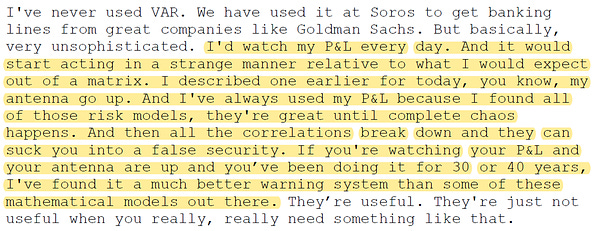
"When I first started out, I did very thorough papers covering every aspect of a stock ... submitted to the research director. I felt very proud of my work. However, he read through it and said, 'This is useless. What makes the stock go up and down?'"

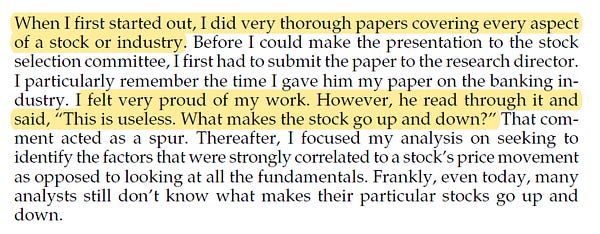
Slootman’s thought experiment. If I could only get one thing done this year, what would it be?

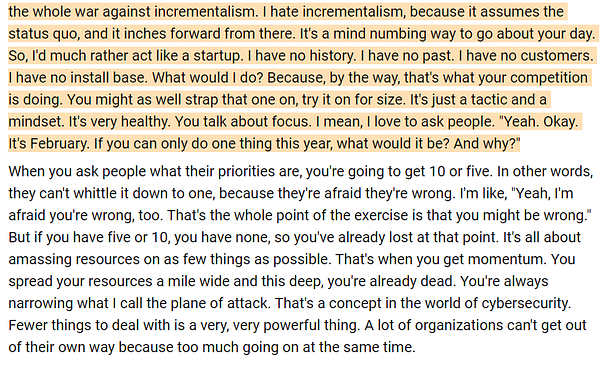
Ted Weschler apparently compounding his massive Roth IRA at 30%!

Serenity now:
Enjoyed this piece? Please let me know by hitting the ❤ button. It makes my day to see whether my readers like the content (it really does!) Thank you!
If you enjoy my work, please consider sharing it with friends who might be interested.🙏

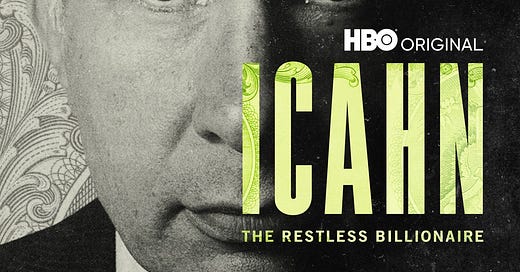



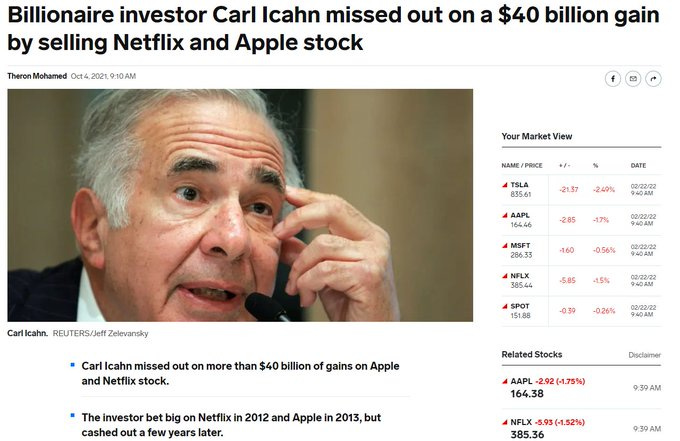


Slava Ukraini 🇺🇦
Amazing post as usual. Thank you.